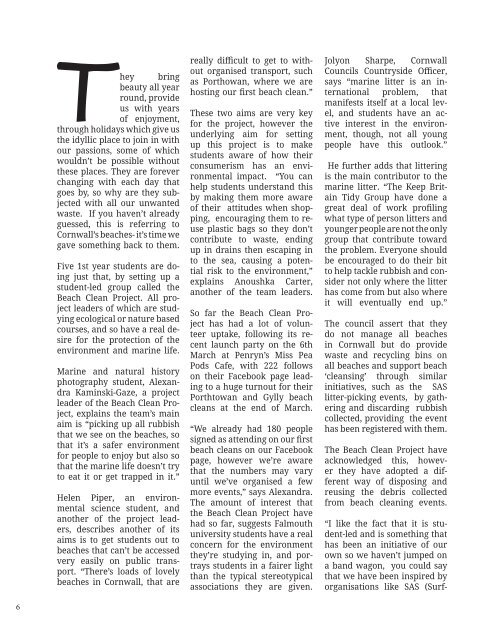Loop Magazine
You also want an ePaper? Increase the reach of your titles
YUMPU automatically turns print PDFs into web optimized ePapers that Google loves.
They bring<br />
beauty all year<br />
round, provide<br />
us with years<br />
of enjoyment,<br />
through holidays which give us<br />
the idyllic place to join in with<br />
our passions, some of which<br />
wouldn’t be possible without<br />
these places. They are forever<br />
changing with each day that<br />
goes by, so why are they subjected<br />
with all our unwanted<br />
waste. If you haven’t already<br />
guessed, this is referring to<br />
Cornwall’s beaches- it’s time we<br />
gave something back to them.<br />
Five 1st year students are doing<br />
just that, by setting up a<br />
student-led group called the<br />
Beach Clean Project. All project<br />
leaders of which are studying<br />
ecological or nature based<br />
courses, and so have a real desire<br />
for the protection of the<br />
environment and marine life.<br />
Marine and natural history<br />
photography student, Alexandra<br />
Kaminski-Gaze, a project<br />
leader of the Beach Clean Project,<br />
explains the team’s main<br />
aim is “picking up all rubbish<br />
that we see on the beaches, so<br />
that it’s a safer environment<br />
for people to enjoy but also so<br />
that the marine life doesn’t try<br />
to eat it or get trapped in it.”<br />
Helen Piper, an environmental<br />
science student, and<br />
another of the project leaders,<br />
describes another of its<br />
aims is to get students out to<br />
beaches that can’t be accessed<br />
very easily on public transport.<br />
“There’s loads of lovely<br />
beaches in Cornwall, that are<br />
really difficult to get to without<br />
organised transport, such<br />
as Porthowan, where we are<br />
hosting our first beach clean.”<br />
These two aims are very key<br />
for the project, however the<br />
underlying aim for setting<br />
up this project is to make<br />
students aware of how their<br />
consumerism has an environmental<br />
impact. “You can<br />
help students understand this<br />
by making them more aware<br />
of their attitudes when shopping,<br />
encouraging them to reuse<br />
plastic bags so they don’t<br />
contribute to waste, ending<br />
up in drains then escaping in<br />
to the sea, causing a potential<br />
risk to the environment,”<br />
explains Anoushka Carter,<br />
another of the team leaders.<br />
So far the Beach Clean Project<br />
has had a lot of volunteer<br />
uptake, following its recent<br />
launch party on the 6th<br />
March at Penryn’s Miss Pea<br />
Pods Cafe, with 222 follows<br />
on their Facebook page leading<br />
to a huge turnout for their<br />
Porthtowan and Gylly beach<br />
cleans at the end of March.<br />
“We already had 180 people<br />
signed as attending on our first<br />
beach cleans on our Facebook<br />
page, however we’re aware<br />
that the numbers may vary<br />
until we’ve organised a few<br />
more events,” says Alexandra.<br />
The amount of interest that<br />
the Beach Clean Project have<br />
had so far, suggests Falmouth<br />
university students have a real<br />
concern for the environment<br />
they’re studying in, and portrays<br />
students in a fairer light<br />
than the typical stereotypical<br />
associations they are given.<br />
Jolyon Sharpe, Cornwall<br />
Councils Countryside Officer,<br />
says “marine litter is an international<br />
problem, that<br />
manifests itself at a local level,<br />
and students have an active<br />
interest in the environment,<br />
though, not all young<br />
people have this outlook.”<br />
He further adds that littering<br />
is the main contributor to the<br />
marine litter. “The Keep Britain<br />
Tidy Group have done a<br />
great deal of work profiling<br />
what type of person litters and<br />
younger people are not the only<br />
group that contribute toward<br />
the problem. Everyone should<br />
be encouraged to do their bit<br />
to help tackle rubbish and consider<br />
not only where the litter<br />
has come from but also where<br />
it will eventually end up.”<br />
The council assert that they<br />
do not manage all beaches<br />
in Cornwall but do provide<br />
waste and recycling bins on<br />
all beaches and support beach<br />
‘cleansing’ through similar<br />
initiatives, such as the SAS<br />
litter-picking events, by gathering<br />
and discarding rubbish<br />
collected, providing the event<br />
has been registered with them.<br />
The Beach Clean Project have<br />
acknowledged this, however<br />
they have adopted a different<br />
way of disposing and<br />
reusing the debris collected<br />
from beach cleaning events.<br />
“I like the fact that it is student-led<br />
and is something that<br />
has been an initiative of our<br />
own so we haven’t jumped on<br />
a band wagon, you could say<br />
that we have been inspired by<br />
organisations like SAS (Surf-<br />
6


